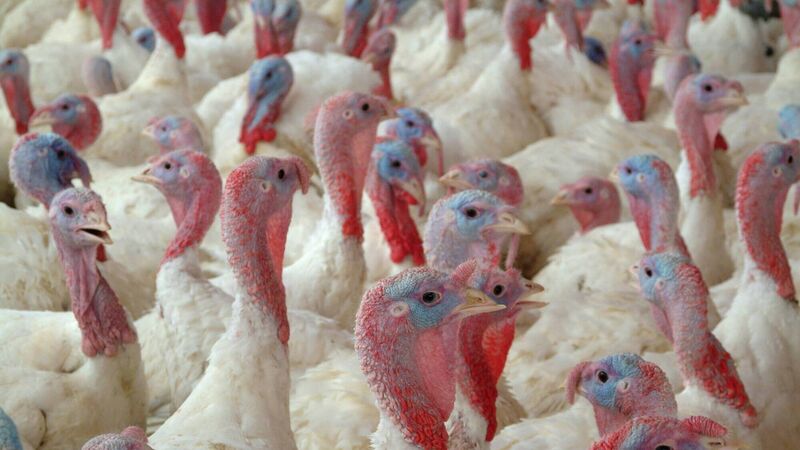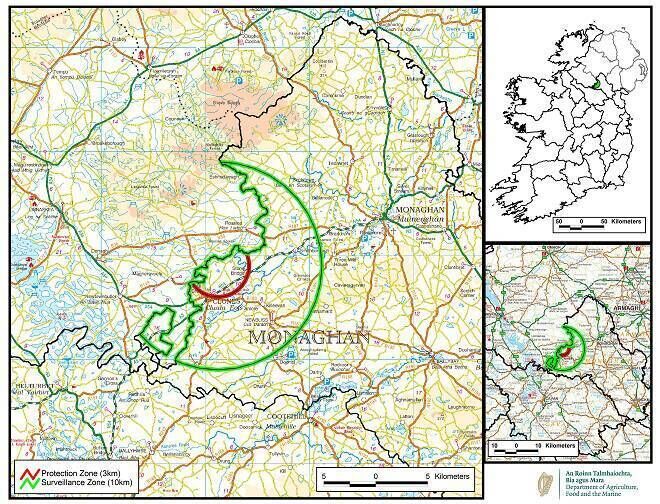Agriculture minister confident bird flu outbreak will be contained amid Christmas turkey concerns

A 3km protection zone and a 10km surveillance zone are now in place. See map below. Stock picture
Avian flu has been confirmed in samples taken from a turkey flock in Co Monaghan, leading to restriction zones being put in place.
The Department of Agriculture, Food and the Marine confirmed the outbreak of Avian Influenza H5N1 near Clones, adding that further testing would be carried out to determine the pathogenicity, with results due over the coming days.
Avian influenza restriction zones, where additional protection and surveillance measures are required, have been put in place and poultry keepers with flocks located within the restriction zones are legally obliged to comply with zone requirements. That means a protection zone of at least 3km radius from the infected holding and a surveillance zone of at least 10km radius.
The Health Protection Surveillance Centre has confirmed that although the H5N1 subtype can cause serious disease in poultry and other birds, the risk to humans is considered to be very low.
Agriculture Minister Charlie McConalogue has said that every step is being taken to mitigate risks posed by avian flu and he was confident that the outbreak would be contained and Christmas stocks would not be impacted.
Speaking on , he said the poultry sector and his department were working together to ensure that every possible step was being taken to contain outbreaks.
“There’s always a risk, all we can do is take all the precautions. That does not mean it will go away but it will minimise risk”.

The owner of one poultry farm in Kildare has expressed concern about the issue of the supply of turkeys this Christmas amid the outbreak.
Billy Gray of Feighcullen Farm told the same station that if turkeys have to be culled because of avian flu then that will create a demand. While the business was resilient and there was a certain amount of surplus, if there were more cases, supply could become an issue.
As a small producer, Mr Gray said he was very worried and that there was no easy solution. Culling was the correct action morally and from a humane perspective. The best protection remained hygiene standards.
Similar outbreaks elsewhere in Europe and in Britain will also have an impact on supply, he cautioned.
Infectious diseases consultant Eoghan De Barra added that there were very few known cases of transfer from bird to human and no human-to-human transfer to date.
Meanwhile, the Department of Agriculture has advised strict adherence to the precautionary measures against bird flu and a spokesperson said that recent proactive measures had included enhanced biosecurity and confinement regulations under the Animal Health and Welfare Act 2013.
Those regulations require all flock keepers to implement enhanced biosecurity measures and confine all poultry and captive birds in their possession or under their control in a secure building to which wild birds, or other animals do not have access.
Poultry owners have been told to remain vigilant for any signs of disease in their flocks and report any disease suspicion to their nearest Department Regional Veterinary Office. Those signs include sudden death, swollen head, discolouration of neck and throat, loss of appetite, and respiratory distress.
In addition, members of the public are advised not to handle sick or dead wild birds and to keep their dog on a leash in areas with sick or dead wild birds.
A departmental spokesperson stressed there is no evidence of a human health risk associated with consumption of poultry meat, poultry meat products or eggs.
• Anyone with concerns can contact the nearest Regional Veterinary Office or ring the Avian Influenza Helpline on 01 6072512 (or 01 4928026 outside office hours).









